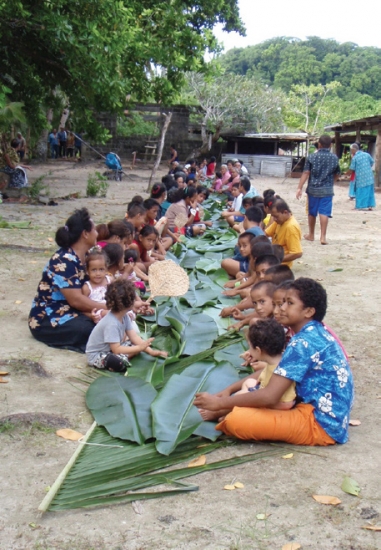
My youngest daughter Nadine, born in South Africa, was 5 when we made aliyah. After her stint in the IDF she did what most kids do, and travelled around the world until she found Australia. There, while she was studying Alternative Medicine, she met and married Carl and gave me two precious grandsons, Noah and Saulei. Her husband Carl was born in Suva in the Fiji Island chain but his mother's family comes from the island of Rotuma, a dot in the Pacific Ocean about 500 km northeast of Fiji. Carl has a 'soul connection' to this island which is why they are there at present where he is building a house for family members. It is a primitive island because there is no tourism and its 2,000 inhabitants live happily in their lack of abundance simply because they know no other way. They are self-sufficient and grow their own crops, spearfish in the ocean or slaughter cows or pigs.
Nadine writes a blog about her experiences and her adjustment from the life of luxury she lived in Israel and Sydney, to being an 'island girl'. The following is an excerpt from her blog. Phyllis Waldbaum
My new favorite place in the whole wide universe is my bed ... it is right next to the window which faces out to the bay, and is the only place in the house that gets the cool ocean breeze without too many flies and mosquitoes buzzing about. This is where I have peace.
As I write this, a couple of the local ladies are in the water cleaning out the intestines of a cow. They had just killed a cow a bit further down the beach for a funeral ceremony tomorrow. Carl came home with a bloody fatty axe and knife because he was helping them to chop the thing up, while Noah was watching curiously and Saulei was asleep. I was happy to stay at home and pretend that it wasn’t happening ...
There have been a few of these big 'do's here since we arrived. It is the most amazing effort when the community comes together to organize. The first time I experienced it was when we were here three years ago for Noah’s first birthday celebration. I couldn’t believe how much hard work and effort they put into these celebrations, I had never seen anything like it before.
For days in advance they start collecting the wood to burn for the earth oven, they build a shelter from corrugated iron and chop off posts from local trees. They harvest massive amounts of Taro, kill pigs and a cow, and work through the night to prepare the earth oven and cook the beasts through the night so that they would be ready to eat immediately as they drag them out of the earth oven.
They clean out the intestines and then cook them - apparently its one of the best parts of the beast. Not for me, thank you very much. The other day, when they killed a cow for Carl's cousin's anniversary of his death, I asked Carl, as they were cutting the thing up, if he could sneak me an eye fillet or a juicy rib ... he looked at me and laughed. All they do here is kill the beast, skin and gut it, chop off the limbs, cut it thru’ the middle and chuck the whole thing into the earth oven. So when they pull it out, several hours later, you just get big chunks of flesh to eat with nothing more than salt. So prehistoric. So Flintstones...
For these occasions they lay long rows of coconut tree leaves for people to sit on, and on top of them, banana leaves as the “table cloth”. When all is ready, the men come out with baskets filled with the cooked Taro and the flesh of the beasts. They plonk massive chunks of it on the banana leaves in front of you, chuck in a few cans of “potcow” (tinned meat) and then you eat. You eat until you’re full, and then you fill your doggy bags, which hopefully you have brought from home, or you’re given some Pandanas leaves to use as doggy bags and you take home what’s left on the 'table'. A successful occasion is judged by the amount of food you have to serve and the amount people can take home with them.
Because there is no refrigeration, everything has to be eaten immediately, so for the next 24 hours all we eat are derivatives of cow or pig meat ... bone soup ... reheated meat ... more soup. Luckily, I brought some dry herbs to flavor things up a bit. The worst thing about these meat fests is that I live in a house full of grubby men, and for days after eating lots of meat, I have to bear the disgusting sounds and smells emitting from their bodily orifices. No respect for the ladies, or should I say, LADY, in the house ... GROSS!
Preparation for these things takes days and as soon as everyone has finished eating, they get up and go and it's all over. This takes about half an hour.
The men here work so hard they hardly sleep through the nights. All I observe and understand of it, is that they enjoy it. They giggle and laugh and make fun out of everything and everyone, then they eat massive amounts of food and then crash.
Men here are REAL men, and women are like real men too. They work really hard. They never cry or show any emotion or difficulty or even dare to talk about it. If something is painful or difficult, their coping mechanism is to laugh. The other day I was in the kitchen with Mua and another Auntie, when Mua told us that the old lady from across the road was very sick and they had called the doctor to come over. To that, the Auntie let out a big laugh. Minutes later someone came around and said that she had died.
Within minutes, Rechelli, our neighbor, started banging on the Rotuman version of a “gong”, which is a hollow carved piece of log which they bang on with big sticks in a particular rhythm. They use this to call for prayer times at the church, but as I just found out, they also use it to announce that something has happened in the village. I watched Rechelli bang the thing with all her might for ages, and tears filled my eyes. She was going nuts on it, and I thought- what a great outlet of feelings. To bang the guts out of a big log. That is how she lets the village know something has happened, and within minutes people start arriving at the deceased’s house.
It was the day that Mua was leaving to go back to Fiji. All morning she was preparing to leave, packing, and organizing loads of Taro and coconuts to take with her, but as soon as the word of the old lady’s death arrived she dropped everything and went across the road to help organize the funeral arrangements.
When someone dies they lay the body on a bed of mats, with the white ceremonial mat underneath them and another one hanging on top of them. People come around to pay their respects and bring gifts, usually a mat, sarong or money. I went with Mua and other relatives and placed a mat next to the body. I haven’t seen a dead body in a while, and I was really curious. I kept trying to peep at it ‘coz I wanted to see what it looked like. It seemed like such a natural and uneventful thing to the rest of the people there.
In the meantime the men go and dig the hole for the grave. I didn’t measure if it was 6ft deep but it didn’t look very deep, the lazy buggers. Carl helped with doing that. When would any of us, unless we work in a cemetery or are trying to hide a dead body, get the opportunity to dig a grave? They make a bottomless coffin lined with some colorful silk fabric in which they place the body, wrapped in a traditional woven mat.
They all hung out in the graveyard, laughing and making fun, the kids playing around in between the graves and waiting till they brought the body. While the men did that the women and the chiefs sat at the house and sang songs. I didn’t understand what they were about, but they sounded beautiful. They were sounds with which I would like to rise to heaven.
I was really curious to see how they bring the body over to the graveyard and bury it, but unfortunately I fell asleep ... so I missed it, but Carl said that they mucked around a lot in trying to get the thing down the hole. Because the death wasn’t anticipated, there wasn’t enough time to prepare the proper traditional ceremony for the funeral, so they just fed everyone tinned meat and rice, and planned the proper 'do' for five days later.
On the day of the ceremony, the men were awake before light (obviously waking me and the kids too with all the noise they made) and went to do whatever it is they do, and the kids and I went over to the deceased’s house and had tea and bread for breakfast. Then we waited a while, until the earth ovens were opened (one of which was right outside my bedroom window). The day before, I came outside to find a dead pig lying feet up and tongue hanging out, ready to be gutted and chucked in the burning rocks. Obviously I was totally grossed out and tried to stay away until it was deep underground, but as usual, Noah was really curious and examined it from all directions ... And the feast begins ... What an experience!
Another interesting story to tell is Noah’s rash story and its magical disappearance. We have no idea what it was or why it happened, but he came up with this really weird rash all over his body which, within a couple of days, got worse and spread and looked quite violent. If we were anywhere else in the world we probably would have gone straight to the doctor or hospital to get it checked out, but here I asked the elderly ladies what it was, and what to do. All they said was that he mustn’t get wet, should stay out of the sun and dirt, and go get massaged by the family who does the special massage for this condition.
In Rotuman culture each family 'owns' a massage for different ailments, so if you get sick with something you go to the family who 'owns' the massage and they massage you for a few days or however long is necessary. Carl’s family 'owns' the massage for stomach problems. Very non-descript, but if you have a sore tummy you come over here and get it massaged.
So off we went for five days in a row to a lady in a different village for Noah to be massaged if you can call it that. It was very 'witchety-poo' if I might say so myself, and even I was very skeptical about it. All she did was wave her hands around him, not even touching him, then rubbed a bit of Johnson’s baby oil on him, then some oil on a special leaf and brushed the leaf down his body a few times, and that was it … about 10-15 minutes at the most. She said to keep him out of sun and dirt and not to wet him, so we had to “dry clean” him as they call it here. I was a bit worried because it didn’t look good and I was googling “rashes” on the internet to see if I could get any understanding. By the second day it had started to go away, and by the fourth day it was gone! Weird but wonderful … I have to learn to trust the local medical practices more…
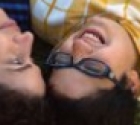 A PLACE OF THEIR OWN
A PLACE OF THEIR OWN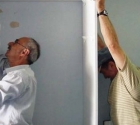 THANK YOU!
THANK YOU! DEAR EDITOR 156
DEAR EDITOR 156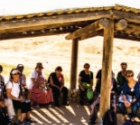 From Bible to Bedouins and Battles
From Bible to Bedouins and Battles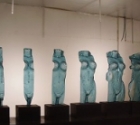 Trip to the Dead Sea
Trip to the Dead Sea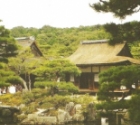 Japan
Japan